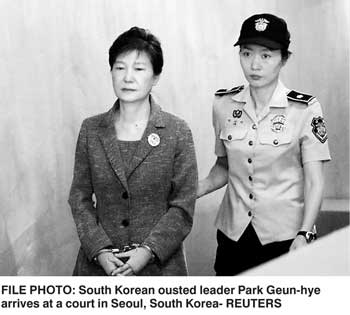Tuesday Feb 24, 2026
Tuesday Feb 24, 2026
Saturday, 7 April 2018 00:36 - - {{hitsCtrl.values.hits}}
 Seoul (Reuters): A South Korean court jailed former President Park Geun-hye for 24 years on Friday over a scandal that exposed webs of corruption between political leaders and the country’s conglomerates.
Seoul (Reuters): A South Korean court jailed former President Park Geun-hye for 24 years on Friday over a scandal that exposed webs of corruption between political leaders and the country’s conglomerates.
Park became South Korea’s first democratically elected leader to be forced from office last year when the Constitutional Court ordered her out over a scandal that landed the heads of two conglomerates in jail.
The court also fined Park, the daughter of a former military dictator, 18 billion won ($16.9 million) after finding her guilty of charges including bribery, abuse of power and coercion.
“The defendant abused her presidential power entrusted by the people, and as a result, brought massive chaos to the order of state affairs and led to the impeachment of the president, which was unprecedented,” Judge Kim Se-yoon said as he handed down the sentence.
The court ruled that Park colluded with her old friend, Choi Soon-sil, to receive 23.1 billion won from major conglomerates including Samsung and Lotte to help Choi’s family and bankroll non-profit foundations owned by her.
Prosecutors sought a 30-year sentence and a 118.5 billion won ($112 million) fine for Park.
Park, 66, who has been in jail since March 31 last year, has denied wrongdoing and was not present in court.
The judge said Park had shown “no sign of repentance” but had instead tried to shift the blame to Choi and her secretaries.
“We cannot help but sternly hold her accountable,” Kim said.
Park apologised at her trial for seeking help from Choi, who had no policy or political experience, but that was as close as Park came to admitting any guilt.
The sentence will be a bitter blow for Park, who returned to the presidential palace in 2012 as the country’s first woman leader, more than three decades after she left it following the assassination of her father.
Her ouster from office last year led to a presidential election won by the liberal Moon Jae-in, whose conciliatory stand on North Korea has underpinned a significant warming of ties between the rival neighbours.
Moon’s office said Park’s fate was “heartbreaking” not only for herself but for the country, and added that history that was not remembered history would be repeated.
“We will not forget today,” the office said.
Up to 1,000 Park supporters gathered outside the court, holding national flags and signs calling for an end to “political revenge” against her.
Supporters, opponents
Prosecutors accused Park of colluding with Choi to receive 7 billion won from Lotte Group for favours, while pressuring big businesses to bankroll non-profit foundations run by Choi’s family and confidants.
Park was also charged with taking bribes totalling 29.8 billion won from Samsung, the world’s biggest maker of smartphones and semiconductors.
Choi was convicted and jailed for 20 years after a separate trial in February.
The chairman of the Lotte Group, the country’s fifth-largest conglomerate, Shin Dong-bin, was jailed for two years and six months.
Samsung Group heir Jay Y. Lee was jailed for a similar term on charges of bribery and embezzlement but in a surprise decision in February, an appeals court freed him after a year in detention.
Park’s supporters and opponents reflect divisions in a society still haunted by Cold War antagonism.
Most supporters are older conservatives who remember her father’s authoritarian 18-year rule, beginning in 1961, when their country began its remarkable surge towards becoming an economic power.
Younger, liberal voters, who staged months of protests against Park before her ouster, will be hoping the verdict will mark a major step towards ending the self-serving collusion between political leaders and the chaebol conglomerates.
Park is the latest former leader of South Korea to run afoul of the law.
Her predecessor, Lee Myung-bak, is also being investigated for corruption.
Chun Doo-hwan, a former military dictator, was found guilty of mutiny, treason and corruption in 1996. He was sentenced to death but released after two years under a presidential pardon.
Chun’s successor, Roh Tae-woo, was also convicted of treason, mutiny and corruption in 1996 and jailed for more than 22 years but served just over two years before being released.